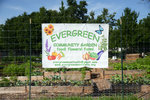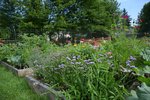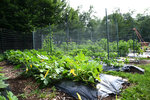 Narrowsburg
NarrowsburgLight Rain Fog/Mist, 43°
Wind: 8.1 mph
 Narrowsburg
NarrowsburgAt first glance, a garden might not look like a tool that can aid in the fight against systemic oppression, but community and youth leaders in Monticello are showing Sullivan County just how powerful …
Stay informed about your community and support local independent journalism.
Subscribe to The River Reporter today. click here
This item is available in full to subscribers.
Please log in to continue |



At first glance, a garden might not look like a tool that can aid in the fight against systemic oppression, but community and youth leaders in Monticello are showing Sullivan County just how powerful one garden can be.
Located at the Monticello Housing Authority, the Evergreen Community Garden was created as a way to provide residents with fresh, healthy food right in their backyard. The project also doubles as an educational program for local youth, who have been working diligently all summer long to pull the weeds, water the plants and maintain the garden.
But it has not only been informative for the kids; president of the project, Elaine Williams, says this has been a learning experience for her personally. She has had plenty of experience with agriculture, growing up on a farm in South Carolina—but things don’t grow in South Carolina like they do in Sullivan County. She calls it a whole different ball game here.
Fortunately, there are also lots of people involved who have plenty of firsthand experience with the way things grow in Sullivan County, including several members of the Sullivan Alliance for Sustainable Development (SASD), which is facilitating this project.
This team of both experienced and green growers has nurtured a diverse assortment of vegetables and fruits, chosen based on what residents most wanted to have available. Aside from edibles, the garden also boasts gorgeous flowers that were contributed by Tannis Kowalchuk of Willow Wisp Farm in Damascus, PA.
In addition to the firsthand experience Monticello youth gain from working inside the garden, this program has also given them the opportunity to take field trips to local farms and to take classes through Cornell Cooperative Extension. Class topics so far have included cooking, nutrition and business. Youth leaders Kyaza Turane and Robert Rodriguez say that this education addresses systemic inequality and oppression at levels that many never even consider.
“This is about being able to overcome the system that breaks you down and the system that wants you to eat the fast food or wants you to go to the corner store and buy chips,” said Turane. “People don’t think that’s a form of oppression, but it is… Building gas stations and McDonalds that are closer than farmers’ markets helps and fuels that oppression.”
Turane went on to explain that for people growing up in this area as she did, the lack of opportunities to eat healthily are directly correlated to other racial and class-based inequities that run rampant in the U.S. Citing just one example of this correlation, she said, “If you wake up and you eat a good breakfast, you feel better in school, and that helps overcome this feeling that you can’t do better in school than the person with more opportunities than you… It’s something very minute, but it makes a huge impact on the people who live through it.”
The community garden is still in its first year of operation, and it seems to be off to a strong start. Residents who did not participate this year have already been inquiring about when they can fill out an application to get a plot in the future. Williams says that this high volume of interest poses a problem for them, as they have space for only so many plots. But for a grassroots initiative, this a good problem to have.
Looking ahead, the project leaders hope to monetize this garden and make it self-sustaining. There is a portion of crops referred to as the “market garden” that they plan to sell to farmers’ markets and also to community members. “We’re trying to make it available to everyone,” said Turane.
Aside from SASD, there are many groups and institutions that have made this garden a possibility. The garden received initial seed money from the Sullivan County Legislature, and further support from the Village of Monticello, the Cornell Cooperative Extension, Sullivan Renaissance, North Star and individual donors. Besides seed money, the garden has also lierally received seeds from Willow Wisp Farm, Apple Pond Farm, Wild Yarrow Farm and Panther Rock Farm.
Like the plants growing here, there is so much more to the Evergreen Community Garden than what we see on the surface. It is rooted in providing fresh, healthy sustenance to residents and showing the county that locally grown, natural foods should not be reserved to just those who can pay a higher cost. It is about giving local youth opportunities and experiences that they might otherwise never have, and perhaps inspiring some of them to pursue agriculture as a career. Lastly, it is about showing Sullivan County that farming is still a profitable endeavor financially, spiritually and communally.
Comments
No comments on this item Please log in to comment by clicking here